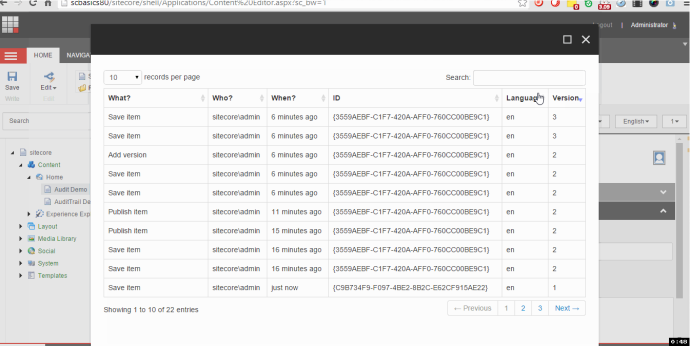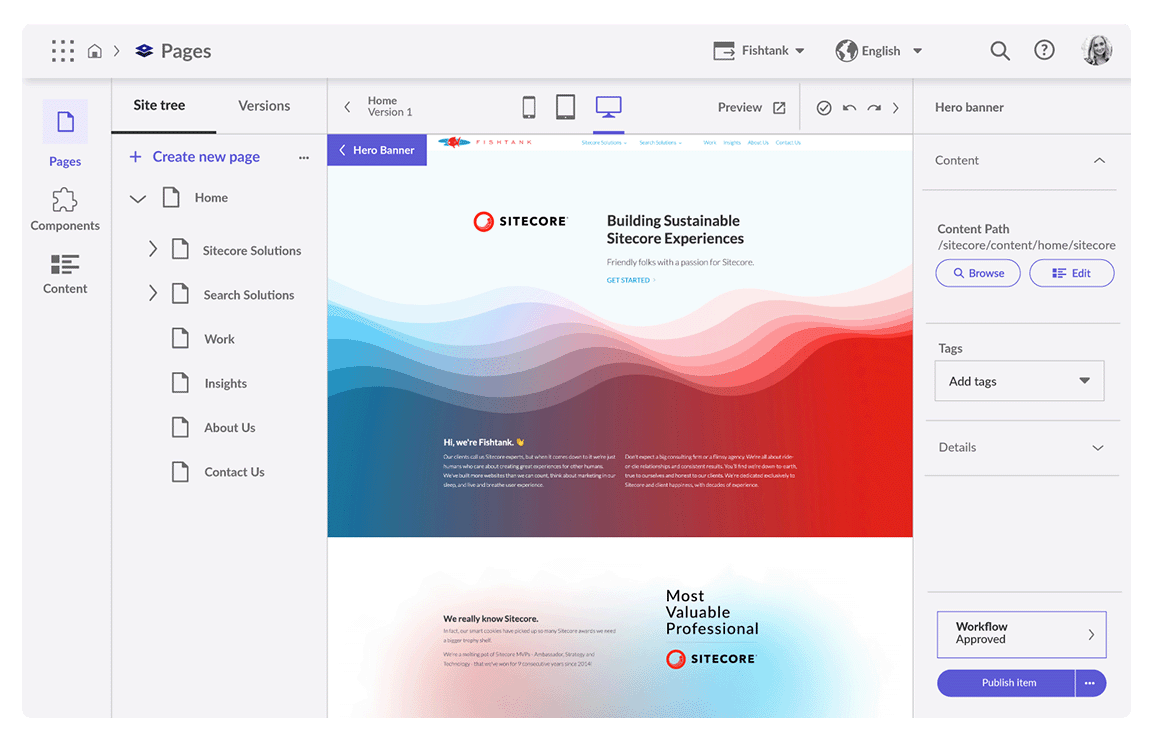What Healthcare Organizations Can Benefit?
Healthcare is a broad term that can cover many types of organizations. Some examples of organizations that can benefit include:
1. Hospitals and Healthcare Systems
- Benefit: Large hospitals and multi-hospital systems require robust CMS platforms to manage vast amounts of patient information, compliance documentation, and communication across multiple locations.
2. Health Insurance Companies
- Benefit: Insurers manage a wide range of content, including claims, policies, customer portals, and educational content for clients. An enterprise CMS helps streamline these processes.
3. Pharmaceutical Companies
- Benefit: These companies need to manage a lot of content, from research data to marketing materials and compliance-related documentation, requiring a sophisticated CMS.
4. Medical Device Manufacturers
- Benefit: These organizations need a centralized way to manage product information, compliance documentation, and marketing content for regulatory bodies, customers, and healthcare providers.
5. Healthcare Providers' Networks (HMOs, PPOs)
- Benefit: Networks of healthcare providers, including health maintenance organizations (HMOs) and preferred provider organizations (PPOs), need to manage a broad range of member services, provider directories, and plan details.
6. Large Healthcare Nonprofits and Research Institutions
- Benefit: These organizations often produce large volumes of content, such as research papers, educational materials, and donor information. An enterprise CMS helps them manage content more efficiently.
7. Specialty Clinics and Care Networks
- Benefit: Networks of specialized care providers (e.g., cancer centers, cardiology groups) may require an enterprise CMS to manage patient education, care plans, and coordination among specialists.
8. Telemedicine Providers
- Benefit: With a need for efficient management of digital content, patient interactions, and online health resources, telemedicine providers can benefit from a highly integrated CMS that manages digital healthcare delivery.
9. Academic Medical Centers
- Benefit: These centers need to manage a combination of patient care, education, and research-related content, all of which are supported by an enterprise CMS.
What Should Healthcare Organizations Look for in a CMS?
When healthcare organizations are selecting a Content Management System (CMS), they should consider several key factors to ensure that the system meets their specific needs and regulatory requirements. Here are some critical aspects to look for:
1. Security Features & Compliance with Healthcare Regulations
- HIPAA Compliance: Ensure the CMS is compliant with the Health Insurance Portability and Accountability Act (HIPAA) to protect patient data.
- Security Features: Look for robust encryption, user authentication, and audit trails to safeguard sensitive information.
- Role-Based Access Control: Implement role-based access to restrict who can view or edit certain content.
- Backup and Disaster Recovery: Ensure the CMS has robust backup solutions and a clear disaster recovery plan.
2. Ease of Use
- User-Friendly Interface: The CMS should be intuitive and easy for non-technical staff to use.
- Customizable Templates: Ability to easily customize templates for different types of content, such as patient information, medical records, and educational materials.
3. Integration Capabilities
- EHR/EMR Integration: The CMS should integrate seamlessly with Electronic Health Record (EHR) and Electronic Medical Record (EMR) systems.
- Third-Party Applications: Ensure compatibility with other healthcare tools and services, such as telemedicine platforms, billing systems, and appointment scheduling software.
4. Scalability and Flexibility
- Growth Potential: The CMS should be scalable to grow with the organization, accommodating more users, more content, and higher traffic over time.
- Adaptability: The system should be flexible enough to adapt to changes in healthcare practices and technology.
5. Content Personalization and Patient Engagement
- Personalized Content Delivery: The CMS should be able to deliver personalized content to patients based on their history and preferences.
- Multichannel Support: Ability to manage content across multiple channels, such as websites, mobile apps, and patient portals.
By considering these factors, healthcare organizations can select a CMS that not only meets their current needs but also supports future growth and regulatory requirements.
Why Sitecore is the Right Choice for Healthcare
In the rapidly evolving healthcare industry, delivering personalized and seamless digital experiences is more crucial than ever. As patients increasingly turn to online resources for healthcare information, communication, and services, healthcare providers need a robust digital platform to meet these demands. Sitecore, a leading digital experience platform (DXP), offers the perfect solution for healthcare organizations aiming to provide exceptional patient experiences while maintaining the highest standards of security and compliance. Here’s why Sitecore is the right choice for healthcare.
1. Compliance and Security
In the healthcare sector, maintaining compliance with regulations like HIPAA (Health Insurance Portability and Accountability Act) and GDPR (General Data Protection Regulation) is non-negotiable. Sitecore is designed with security and compliance in mind, offering features like data encryption, role-based access controls, and audit trails. These features help healthcare organizations protect patient data and meet regulatory requirements without compromising the user experience.
Why Sitecore?
Sitecore’s platform supports secure data storage and transmission, ensuring that sensitive information is handled with the highest level of security. By choosing Sitecore, healthcare organizations can confidently deliver digital experiences that prioritize patient privacy and data protection.
Sitecore allows you to have difference versions of the same content. This allows you to see previous versions of content (and restore those versions if desired) and see an audit trail of whom updated content and when.

Sitecore has multiple compliance and security regulation certifications. Visit their website to learn more and to download compliance certificates as required.
https://www.sitecore.com/legal/privacy-and-security
https://www.sitecore.com/legal/compliance
Sitecore is currently working toward ensuring the solution they offer are HIPAA compliant. Sitecore has obtained HIPAA compliance with their ecommerce, customer data platform and personalize solutions. They aim to have HIPAA compliance for the CMS (XM Cloud) and DAM (Digital Asset Management) solution by the end of 2024.
Sitecore offers a wide range of hosting options to meet your needs. Anything from hosting locally to fully SaaS and everything in between. If you decide to go with a hosted cloud option or even SaaS you can choose where you data is to be stored based on available Azure data residency regions.
2. Streamlined Content Management
Managing vast amounts of content is a challenge for any healthcare organization. Sitecore’s robust content management system (CMS) simplifies this process by allowing healthcare providers to create, edit, and publish content with ease. The platform’s user-friendly interface and workflow management tools enable teams to collaborate efficiently, ensuring that content is up-to-date, accurate, and aligned with organizational goals.
Why Sitecore?
Sitecore’s multilingual support makes it easier for healthcare organizations to manage content across different languages and regions, ensuring that all patients receive accurate information, regardless of their location or language.
Sitecore’s drag and drop authoring experience referred to as “Pages” is very user friendly and will allow for fast delivery of new websites features, components and content.

3. Enhanced Patient Experience with Multichannel Delivery
Today’s patients interact with healthcare providers through a variety of channels, including websites, mobile apps, social media, and email. Sitecore excels at delivering consistent and cohesive experiences across all these touchpoints. Its multichannel delivery capabilities ensure that patients receive the same high-quality experience whether they’re accessing content on a desktop, smartphone, or tablet.
This multichannel approach is particularly beneficial for healthcare organizations that need to reach diverse patient populations. By delivering content that is accessible and consistent across different platforms, Sitecore helps healthcare providers build trust and loyalty with their patients.
Why Sitecore?
Sitecore’s native headless capabilities make it easy to create content once and share it across multiple channels. Channels being websites, mobile apps, advertising channels and social to name a few. Sitecore’s headless capabilities allow any of these channels to connect with Sitecore to retrieve content and other data as desired.
4. Scalability and Flexibility
Healthcare organizations, from small clinics to large hospital networks, need a platform that can scale with their needs. Sitecore’s modular architecture and cloud-based capabilities allow it to grow alongside your organization. Whether you’re managing a single website or multiple sites across various regions and languages, Sitecore provides the flexibility to expand and adapt as your organization evolves.
Why Sitecore?
Performance is king. Users demand an app like experience when using a website. Building a modern website using React, combined with the best content delivery services such as Vercel or Netlify can ensure a high performing website.
Sitecore’s integration capabilities make it easier to connect with other healthcare systems, such as electronic health records (EHR), customer relationship management (CRM) systems, and third-party applications. This interoperability ensures that healthcare providers can offer a seamless experience to patients and staff alike. Sitecore’s own Sitecore Connect solution allows easy integration with any other platform.
As stated previously Sitecore offers various hosting options. The best option for scalability and flexibility is their SaaS DXP solutions. Never worry about upgrades or managing infrastructure. The services scale with you.
5. Personalization and Patient Engagement
One of the standout features of Sitecore is its ability to deliver highly personalized content to users. In healthcare, this capability is invaluable. Patients today expect tailored experiences, whether they’re seeking information about a specific condition, managing a chronic illness, or booking an appointment. Sitecore’s powerful personalization engine allows healthcare providers to create and deliver content that is relevant to each individual’s needs and preferences.
Why Sitecore?
Sitecore enables healthcare organizations to track patient interactions across multiple channels—websites, mobile apps, emails, and more—providing a holistic view of the patient journey. This data can be used to offer personalized recommendations, educational resources, and reminders, ultimately improving patient engagement and outcomes.
Delivering Exceptional Digital Experiences in Healthcare
In an industry where patient trust and satisfaction are paramount, healthcare organizations need a digital platform that can deliver personalized, secure, and seamless experiences. Sitecore stands out as the ideal choice for healthcare providers looking to enhance patient engagement, maintain compliance, and stay ahead in a competitive digital landscape. With its robust personalization capabilities, scalability, security features, and choice, Sitecore empowers healthcare organizations to deliver exceptional digital experiences that meet the unique needs of their patients.
